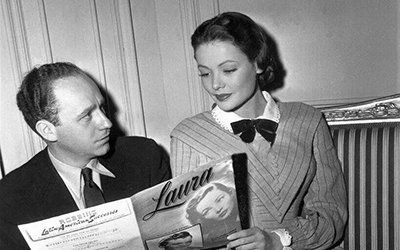A Hollywood Composer States Case for His Craft

Source: Film Music Notes: March / April 1951 / Vol. 10 No. 4
Publisher: New York: National Film Music Council
Copyright © 1951, by the National Film Music Council. All rights reserved.
As a man who long ago discovered that ASCAP is an anagram of ASPCA, and who is therefore against flogging of dead cats, I wish to point out that most anti-Hollywood generalizations will simply not hold water. It is quite disconcerting to find people who ordinarily shy away from generalizations leaping to embrace the obvious and tiresome canards about Hollywood.
From this ever-so-witty viewpoint, the Hollywood composer is a man who uses thirds and sixths because he hasn’t yet discovered fourths and fifths, and because Benjamin Britten has a prior lien on major sevenths and ninths. He is a man who can be counted upon to use the noble French horn for any scene with more than three trees in it because - well, has anybody ever thought that he might use it because he likes it? He is also a laggard who is dallying till G. Schirmer finds it profitable to publish a popular folio called "Twelve-Tone Songs the Whole World Loves" before he will venture to score pictures in that idiom.
The implication, so often and so clearly given by our “serious” brethren, that we of Hollywood do not deserve to rank with them on the basis of quality alone is based on another generalization - one which few people have the authority to make. Aaron Copland, who seems to commute between Hollywood and New York, once said to me: “Sometimes in the middle of a concert of new works in New York, I say to myself: What’s all the fuss about? The boys in Hollywood do this better every day in the week and think nothing of it.”
Film music fulfills at least one requisite of greatness: the only musicians who do not seem to have unlimited time and inclination to criticize it are those who are too busy writing it. Which is too bad, for they are certainly best equipped to criticize, knowing not only its precise faults, but also the underlying reasons.
Far be it from me to say that all movie music is good. Much of it is banal, inept, slavishly following the picture - though, as often as not, too good for it. Its avowed purpose, to help realize the meaning of the film, even when achieved, does not excuse a hackneyed score. But is bad music found in Hollywood only?
Many foreign films have bad scores; most of them We do not get to see and hear. And of the good ones - perhaps William Walton’s fine, romantically conceived and wonderfully apt score for Olivier’s HAMLET will finally put to rest one of the pet notions of film music’s detractors: that only music written in the barest of contemporary styles is worthy of consideration.
In the music of documentary films we can hear and see what happens to serious composers when they undertake to write for the screen. Some scores are, of course, first rate. But considering the great freedom of expression allowed the composers of these (in contrast to the Hollywood composers, who must frequently conduct guerrilla warfare in the underbrush of contemporary harmony and counterpoint) the percentage of good scores is remarkably small.
I have always felt that it takes a genius to make an orchestra sound bad; apparently some of the documentary boys have what it takes. They sneer openly at our occasional pointing up of visual cues, yet some of their best moments are often more Mickey Mouse than music. And when they cast loose and write freely, the resulting scores are apt to have a fair share of all the virtues of film music except the indispensable one of relevance.
The widely praised use of folk music would serve its all too frequent purpose of disguising thematic poverty far better were it not usually so inexpertly done. And the ersatz, the corny imitation jazz! The terrible 1923 “Shimmy-Fox”, which always sounds as if it should be called “I’ve Got Those Fasahnenstrasse Blues Again!” Even that old standby of the composer, the battle scene, is not safe, since it is apt to be over shadowed by the open war-fare between the visual image and the music.
Picture music has come a long way since the days when that bright tenet, “If you notice the music, it’s not good” was all but an axiom of the Production Code, and when it was confidently stated that no good film music could have meaning or validity apart from its association with the visual image. Today there is some music written for pictures which makes very good sense on the basis of material, form, instrumentation - in short, as music. Paradoxically, it is the ordinary music lover who is now beginning to respond to the better movie music, while the critic usually inters the good with the bones of the bad, with the off-hand remark that it is beneath his notice.
We are composers like other composers - heirs to the same traditions and problems, followers of music as a way of life, who ask only that our music be judged fairly and objectively.



